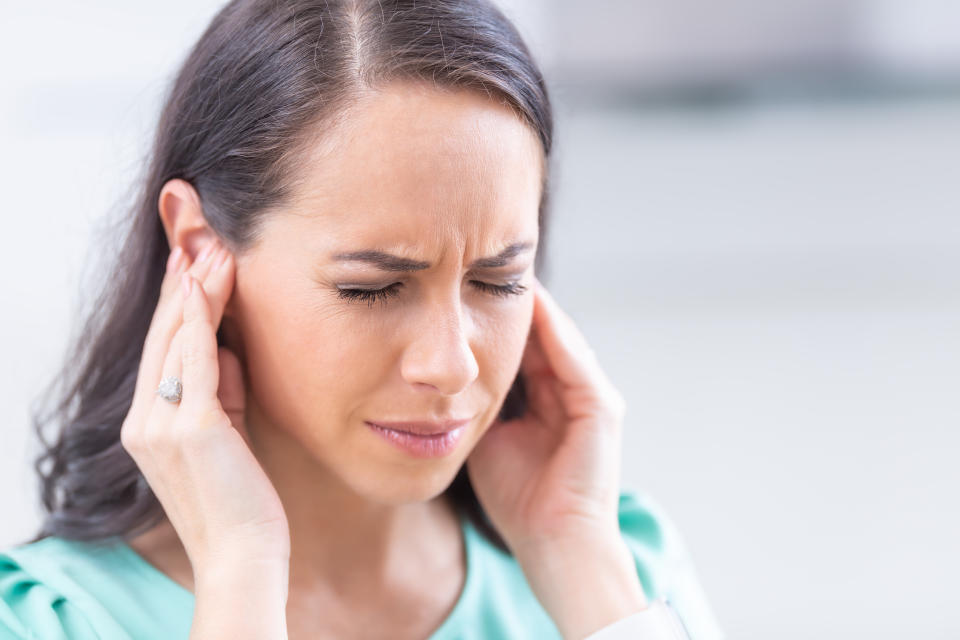Coronavirus makes tinnitus worse for 40% of people with the hearing disorder, study suggests

The coronavirus may exacerbate tinnitus in people with the hearing disorder, research suggests.
It is increasingly emerging that what was once considered an infection of the airways can theoretically affect any part of the body, including the ears.
To learn more, scientists from Anglia Ruskin University in Cambridge looked at more than 3,000 people with tinnitus – defined as hearing ringing, whooshing or buzzing without an external source.
Results revealed two in five (40%) of those who endured coronavirus symptoms found their hearing disorder became more pronounced.
Read more: Living with young children linked to reduced risk of dying with coronavirus
Seven even anecdotally reported “COVID-19 initiated tinnitus”, an issue that has been flagged before.
While tinnitus often has no clear cause, the coronavirus has been found in cells lining the middle ear. The infection can also trigger inflammation and the release of chemicals that have been linked to hearing loss.
Tinnitus can also be brought on by anxiety and depression, with the scientists wondering if the stress of the pandemic has made matters worse.

Hearing problems were flagged as a coronavirus complication in July.
After looking at 121 coronavirus survivors eight weeks after they were discharged from hospital, scientists from the University of Manchester reported how 16 (13.2%) complained their hearing was worse, while eight developed tinnitus.
Read more: Immune response six months after overcoming mild coronavirus
Rebecca Edgar, 29, from Clacton-on-Sea, has had tinnitus since catching an ear infection as a child. She has found her symptoms have worsened during the pandemic.
“For the last 20 years I’ve had a constant high-pitched buzzing in my ear, but there is no doubt this is the worst my tinnitus has ever been,” she said.
“My tinnitus has got so loud I’m now struggling to hear my toddler when he talks to me from the back seat of the car, and it’s making it harder and harder for me to fall asleep.
“It’s a vicious cycle too because the more I worry about my tinnitus, the louder it gets and that increases my stress further.
“I’m deaf in one ear and I’m so scared catching COVID-19 [the disease caused by the coronavirus] could destroy what’s left of my hearing.”
Pandemic aside, one in three people are said to experience tinnitus at some point in their life.

To better understand how the coronavirus may worsen or even trigger tinnitus, the Anglia Ruskin scientists sent a survey to thousands of people, most of whom lived in the US or UK and already had the hearing disorder.
Two in five (40%) of the participants who reported having coronavirus symptoms – namely a fever, cough, or loss of taste or smell – complained a suspected infection made their tinnitus worse.
Seven even blamed the coronavirus for bringing on the whooshing, buzzing and ringing.
More than half (54%), however, reported no change to their tinnitus symptoms, while a handful (6%) claimed appearing to catch the coronavirus improved their hearing disorder.
Tinnitus has no set treatment, with patients often being encouraged to take up hobbies that help distract them from the incessant noise.
The scientists wondered if for some “focusing on surviving the virus helped reframe problems and push tinnitus into the background of their thoughts”.
Read more: App could detect asymptomatic coronavirus
The NHS recommends tinnitus patients “do not have total silence”, with soft music sometimes providing a welcome distraction.
For some of the participants, being away from a crowded, noisy office helped to calm their disorder, while others found the quiet atmosphere of working from home made matters worse.
“Others reported working from home exposed them to more noise than usual from neighbours, electrical tools and children, which aggravated tinnitus,” the scientists wrote in the journal Frontiers in Public Health.
The scientists also reported how financial worries, loneliness, insomnia or a fear of catching the coronavirus made tinnitus more bothersome for just under a third (32%) of the participants.
Some also blamed the stress of video calls and home schooling, as well as increased coffee and alcohol consumption as people attempted to navigate the pandemic.
Tinnitus generally becomes more common in old age, particularly among men.
Despite this, the scientists found the female participants under 50 were particularly bothered by their hearing disorder.
Watch: Can you catch coronavirus twice?
“The findings of this study highlight the complexities associated with experiencing tinnitus and how both internal factors, such as increased anxiety and feelings of loneliness, and external factors, such as changes to daily routines, can have a significant effect on the condition,” said lead author Dr Eldré Beukes.
“Some of the changes brought about by COVID-19 appear to have had a negative impact on the lives of people with tinnitus and participants in this study reported that COVID-19 symptoms are worsening or, in some cases, even initiating tinnitus and hearing loss.
“This is something that needs to be closely examined by both clinical and support services.”
With tinnitus not being a life-threatening condition, many patients struggled to access support during the UK’s first coronavirus wave, when non-essential healthcare services largely shut up shop.
Before the pandemic hit, more than four in five tinnitus patients were reportedly already unhappy with the treatments they were offered.
“With the second wave of COVID-19 and the resulting national lockdown likely to increase feelings of stress and isolation, it’s vital we don’t see the same mistakes as before when it comes to community health provision for people with tinnitus,” said co-author David Stockdale, from the British Tinnitus Association.
“Poor treatment of tinnitus in the early stages often leads to much worse cases and severe tinnitus can have a huge impact on mental health.
“With this in mind, as the COVID-19 second wave takes hold, the healthcare system needs to ensure anyone who develops tinnitus or experiences a worsening of their condition can access the professional healthcare support they need as quickly as possible.”
Watch: What is long COVID?




